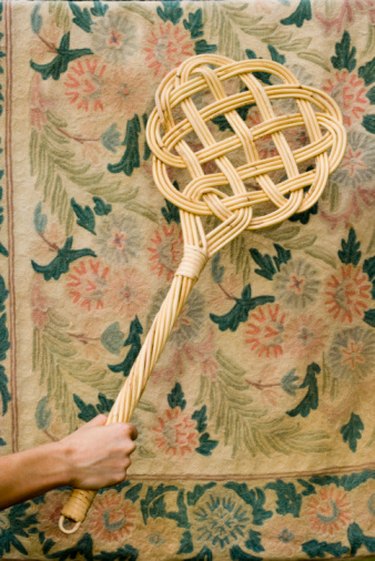Things You'll Need
Hose
Soap
Marker
Measuring tape
Marker
Scissors
Dowel
Saw
Glue

Before vacuums and carpet sweepers became popular, carpet beaters were the most common way to clean household carpets and rugs. By hanging a carpet over an outdoor railing or clothesline and repeatedly striking it with a beater, a cleaner could drive the dust from the carpet. Although carpet beaters were traditionally solid and shaped like paddles, a 1909 issue of Popular Mechanics recommends making your own flexible carpet beater using a section of garden hose and a wooden handle. The hose allows the beater to strike the carpet with a whiplike motion.
Step 1
Cut a 3-foot-long section from an old or broken garden hose. Wash the hose thoroughly with soap and water to remove any dirt.
Video of the Day
Step 2
Draw a circle around the diameter of the hose about 4 inches from one end.
Step 3
Wrap a measuring tape around the end of the hose and, using a marker, make a mark every 1/2 inch around the hose.
Step 4
Cut the hose into vertical strips 1/2 inch wide, cutting along the marks you made. End the strips at the previously drawn circle, leaving a 4-inch length of hose uncut.
Step 5
Take your modified hose section to a hardware store and test its fit over several dowels until you find one that fits snugly. Purchase the dowel.
Step 6
Trim the dowel with a saw until it is 2 feet long. If you do not own a saw or wood-cutting implement, see if the hardware store can trim the piece for you.
Step 7
Place a bead of glue on the inside of the uncut part of the hose.
Step 8
Thread the 4-inch, uncut part of the hose onto one end of the dowel. Press the rubber hose firmly onto the dowel and then allow the item to dry for the amount of time recommended by the glue's directions.
Tip
This to That, a gluing advice website, recommends using a PVA glue for attaching vinyl hoses to the wood handle or a contact adhesive for attaching a rubber hose.
Video of the Day